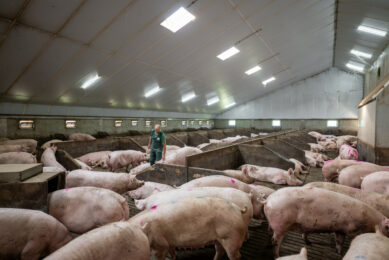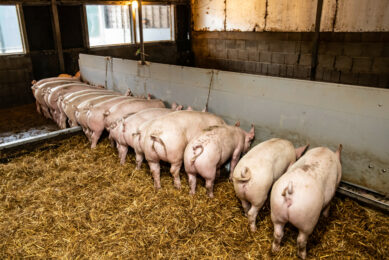China teams up with IBM to improve pork safety

IBM and Shandong Commercial Group Co. Ltd. (Lushang Group) announced that they have built a system that will help ensure the safety of pork products in the Shandong Province while improving the efficiency of the food supply chain in the region.
Pork is a big business in China, which produces more pigs than the next 43 pork producing countries combined. The country consumes about half the pork produced worldwide, with the average citizen eating about a half a hog each year. In 2006, a fatal outbreak of porcine blue-ear disease killed millions of Chinese pigs. These losses represented a tiny portion of the country’s total herd of more than 660 million, but led to soaring pork prices.
Pork is a major pillar of the economy in the Shandong Province, one of China’s most important agricultural regions. To limit the impact of porcine diseases and prevent tainted pork from being sold to consumers, Shandong Provincial Municipality asked Lushang Group, one of China’s top 10 retail companies, and its affiliate the research body – the National Engineering Research Center for Agricultural Products Logistics – to devise a system that would improve accountability and safety in the region’s pork industry.
In 2010, Lushang Group began working with IBM to create the new system, which is being tested by six selected slaughter houses, six warehouses and about 100 Inzone hypermarkets and supermarkets across the Shandong province. When fully deployed in 2013, the system will allow Lushang Group to monitor and trace the movement of meat across all phases of the supply chain, including farms, processing plants, trucks and supermarkets.
“When fully deployed, this system will give consumers in the Shandong Province confidence in the pork products they serve to their families,” said Wang Guo Li, director, National Agricultural Research Center for Modern Logistics Engineering. As an agricultural powerhouse within China, our province is committed to improving food safety and this system marks a significant step toward that goal.”
Using the internet of things to create a smarter safer food supply
Using IBM WebSphere software running on IBM System x Servers, experts from IBM China Development Lab and China’s National Engineering Research Center for Agricultural Products Logistics have created a pork monitoring and tracking system that can extract and store actionable business information from the millions of interconnected sensors that make up the “Internet of Things.” The system brings an unprecedented level of accountability and efficiency to every stage of the pork production process. These stages include:
Production: The process begins at pig slaughter houses, where every pig is tagged with a bar code bearing a unique serial number which follows the packed pork products – as they move through the province’s supply chain. In addition to tagging, better monitoring is made possible at these facilities through the addition of cameras that monitor the production process right up until shipping.
Distribution: To ensure that meat is transported at a safe temperature, Lushang Group has deployed temperature and humidity sensors and well as global positioning and geographic information systems. Using these technologies, Lushang Group can track the whereabouts of trucks and monitor the temperature and humidity conditions in each refrigerated container. If conditions exceed certain thresholds, the system will send an alert to prompt corrective action.
Retailers: Lushang Group has addressed the final phase of the pork supply chain – the retailer – by helping select supermarkets connect their ERP and point of sale systems to the platform, allowing tracking of every item sold.
In the event that a consumer’s illness can be linked to pork produced in the Shandong Province, Lushang Group’s new system will be able to pinpoint the stores that have the tainted food, arrange a targeted recall and in turn, minimize the number of people who get sick, while keeping pork that is safe available for purchase.
“Based on our experiences in building food and pharmaceutical tracking systems in other countries, IBM has helped to create a system that traces pork through the entire supply chain from pig farms all the way to supermarkets,” said Matt Wang, Vice President, IBM China Development Lab. “Using this system, Shandong Province’s pork products will be safer and thus, more desirable to consumers. Governments and pork producers in other countries should take note of what Lushang Group is doing.”
New logistics solutions lab addresses industry-specific requirements
Located in the city of Ningbo in the Zhejiang Province, the IBM China Logistics Solutions Lab was set up in March of this year to bring together advanced data management and analytics skills, industry-specific offerings and the expertise required to make logistics networks and supply chains safer and more efficient. The lab draws on the expertise of a team of consultants, software engineers and IT architects in China as well as IBM mathematicians and industry specialists within the company’s global network of development labs.
Located in the city of Ningbo in the Zhejiang Province, the IBM China Logistics Solutions Lab was set up in March of this year to bring together advanced data management and analytics skills, industry-specific offerings and the expertise required to make logistics networks and supply chains safer and more efficient. The lab draws on the expertise of a team of consultants, software engineers and IT architects in China as well as IBM mathematicians and industry specialists within the company’s global network of development labs.
China, which is rapidly becoming the world’s third largest economy, continues to experience high demand for logistics technology to improve the efficiency of the country’s everyday business.











